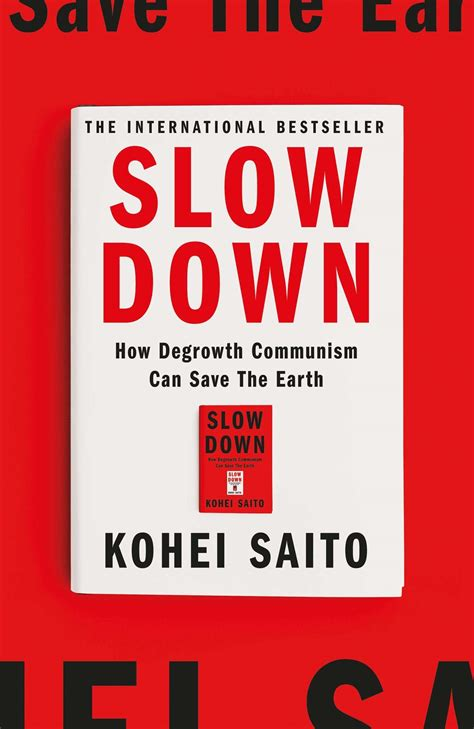Book Review: Slow Down by Kohei Saito
“How Degrowth Communism Can Save The Earth”

In his international best selling new book, Kohei Saito calls for a ‘degrowth‘ pathway to a sustainable future. Degrowth, Post Growth or better still, Steady State Economics, is a concept whose time has truly come. Its adoption as public policy is long overdue, so raising its profile is welcome news.
However, Saito relies heavily on a man who was born more than 200 years ago. By his own admission, he describes how the work of Karl Marx only began to touch on the concept of degrowth toward the end of his life’s work.
It is curious that Marx is so central to this book, when there are so many up-to-date post-growth organizations working in the real world – many of which he cites. Saito doesn’t make a strong case for drawing on Marxist thought to enhance our understanding of degrowth. Marx’s relevance to it is tenuous at best. In fact, by limiting himself to a Marxist critique of late stage capitalism, he fails to appreciate the complexity of the Polycrisis – many elements of which Marx never dreamed of.

What is more curious is that Saito spends only 4 pages on Japan’s involuntary degrowth experience. It is the first major industrialized country to face this. One of the major reasons its burst ‘bubble’ economy hasn’t ‘recovered’ is because its population is contracting. Saito doesn’t mention this. Japan has resisted using immigration to boost GDP (as the Anglo-sphere has). As a result, property prices in the countryside have collapsed. Japan is a goldmine for degrowthers wanting to demonstrate practical ways ordinary people can turn it to their benefit. For example, who is encouraging young people to find ways of abandoning the city rat race for a much easier life in a rural village? Where the elderly population still have many useful ‘degrowth’ skills? But Saito is a philosopher, not a pragmatist and instead only points to the intensifying inequality of late-stage capitalism in Japan.
Where I studied theories of socio-cultural and political evolution at La Trobe University’s Sociology Department in the early 1980s, Marxism was not uncommon. It has since spread through academia in the West like a contagion. I saw little of it when I held an academic position in Japan in the 2000s, but it seems to have gained a foothold there. Saito’s work represents, to me, an unfortunate absence of original thinking.
He claims to favor a way forward that resists
… both a slide into barbarism and some form of autocratic nationalism. It’s not impossible to implement democratic forms of mutual aid that don’t rely on a strong nation to function, instead relying on individuals to voluntarily develop strategies for combating climate change on their own. (p. 70)
He would do well to describe some of those strategies that would actually help people. Instead, he seems to imply that state collapse is nothing to worry about.
This anti-national attitude will only aid the Powers That Be in Japan. The conservative party government there is planning to ramp up immigration without public debate, just as happened in Australia. It’s a recipe for destabilizing democracy.
The book is replete with simplistic binary perceptions of the world. The Global North with our Imperial Mode of Living is, he implies, getting our just desserts as climate refugees overwhelm our borders. There is no mention of the culturally driven demographic surge that contributed to Syria’s implosion and is looking like tipping Iraq in the same direction as their population climbs, sand storms become more frequent and their dams run dry.
The need for change Saito says, quite rightly, is urgent:
The degrowth theory of the new generation must incorporate a much more radical critique of capitalism to work. Yes, I am talking about communism. (p. 86)
The most likely outcome of this book is the barbarism and autocratic nationalism he opposes. It is a dangerous book that will feed into the frustrated, leftist elite aspirants who are waiting in the wings. They, most likely, are among those who have made it a best seller.
This might not be all bad. If it gives the ruling elites a good scare, it might prod them into a latter-day New Deal that shuts down the wealth pump and stabilizes society. That’s how the Guilded Age of the 1920s played out.
